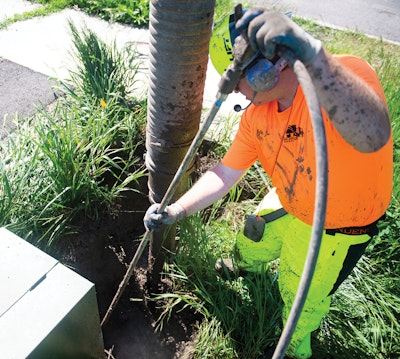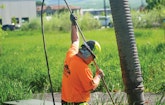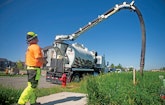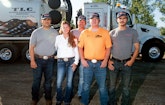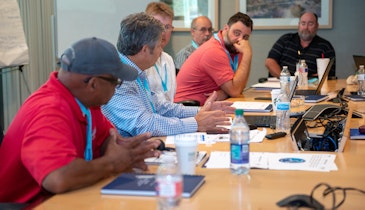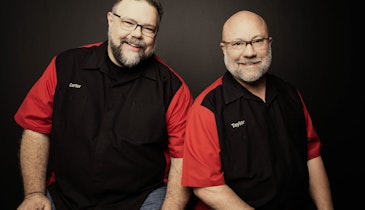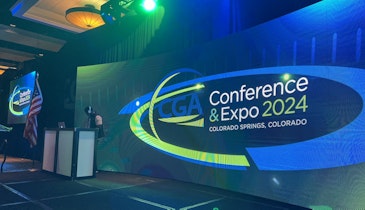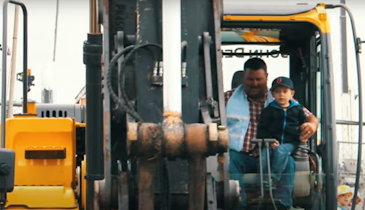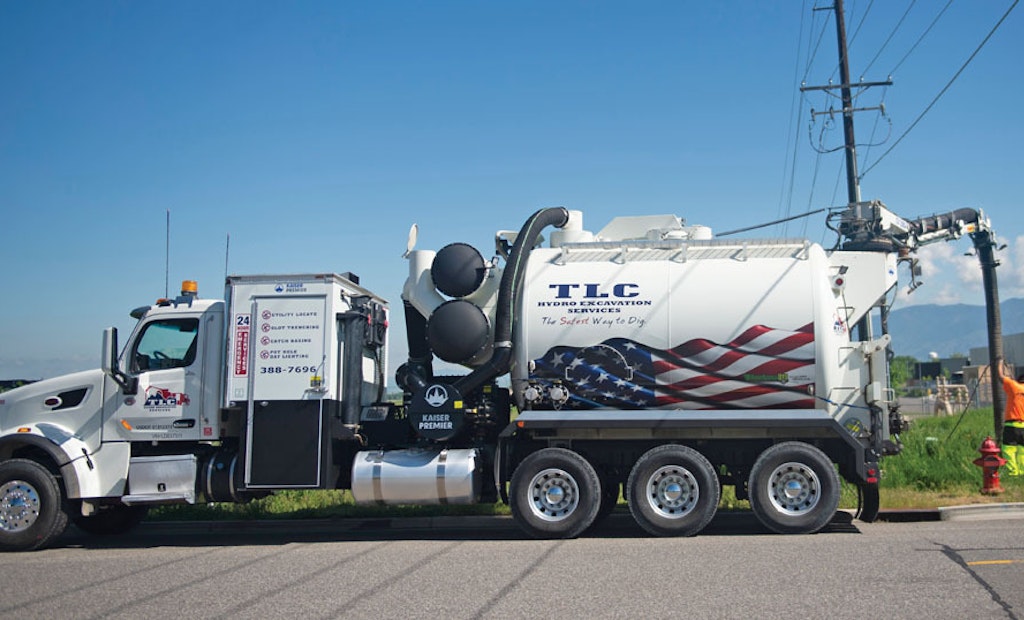
Wes Dooley Jr., division manager at TLC Services in Belgrade, Montana, works behind the truck during a job daylighting for utilities using a Kaiser Premier CV-200 hydroexcavator.
Interested in Vacuum Excavation?
Get Vacuum Excavation articles, news and videos right in your inbox! Sign up now.
Vacuum Excavation + Get AlertsIn the wake of the deep economic recession of 2008 and 2009, TLC Services dropped its slumping excavation and landscaping services and instead morphed into a portable restroom and septic services business.
The TLC in the company name stands for Tree and Lawn Care, its initial service offering. The Dooleys kept the name to retain its high level of brand recognition.
Several years later, however, the company — based in Belgrade, a town near Bozeman in southwestern Montana — jumped back into the excavation field. But this time it beefed up its capabilities with a hydroexcavation truck, which has helped fuel growth at the business, owned by Wes Dooley Sr. and his wife, Lori.
“Hydroexcavation technology intrigued us and our son, Wes Jr., has always loved excavation work,” says Lori Dooley. “So when the economy picked back up, we decided to get back into that field of work. Plus we saw a market niche that we could capitalize because no one else in our area had that capability at the time.”
ADDING ASSETS
To avoid investing too much money while entering a new market, the company bought a used hydrovac truck for around $40,000. Once firmly established, the business eventually bought a new CV-200 hydrovac truck from Kaiser Premier, built on a 2020 Peterbilt 567 chassis.
The truck features a 13-cubic-yard debris tank; a 2,250-gallon water tank; a Cat water pump (3,000 psi at up to 20 gpm); and a PD tri-lobe blower from Robuschi (a brand owned by Gardner Denver).
But it was a worthwhile expenditure in terms of return on investment; the workhorse machine now generates about 17% of TLC’s income, Dooley says.
“My dad is all about adding assets,” says Wes Dooley Jr., age 24. “Even if this truck would just break even, we would always have it here as a tool to use in the future.
“We use it for other jobs, too,” he continues. “If we’re excavating a foundation that’s close to a natural gas line, for example, we’ll use the hydrovac truck for safer excavation. Or if we’re installing a septic system and need to cross a power line, we’ll also use the hydrovac truck for the same reason — safety.”
Much of the hydroexcavation work involves daylighting underground utility and fiber-optic lines, digging trenches for laying new utility lines and potholing for new power poles. The well-diversified company also pumps septic tanks; inspects, repairs and installs septic systems; rents and services portable restrooms; and offers concrete and gravel-shooting services.
“Being a one-stop shop has always been my dad’s plan,” Dooley says. “With so many different irons in the fire, there’s always something for us to do.”
STARTED OUT YOUNG
Dooley has been working for his parents ever since he was a youngster.
“I could run a skid-steer before I was old enough to walk,” he says.
The day after he graduated from high school he started working for TLC full-time. His original plan was to go to college for a year, but he convinced his parents that he could learn more about business by working than he could in college.
Dooley worked in all aspects of the company, but always gravitated toward excavation work. As such, hydroexcavation was a natural fit for his skills and interests. The company had dabbled in hydroexcavating by using a pressure washer on a combination sewer truck.
“We worked with what we had at the time,” he says.
By comparison, using a purpose-built hydrovac truck like the first used Kaiser unit, purchased at an auction, made “a night-and-day difference,” Dooley says.
The company subsequently sold the first Kaiser and then bought two more Kaiser trucks as part of a package deal, then sold one of them, Dooley says.
How does Dooley manage to run a TLC division with no formal business training?
“I had great examples like my father and all his friends around the valley are business owners,” he explains.
DEEP EXCAVATION EXPERIENCE
In terms of more conventional excavation work, TLC is capable of doing everything from installing septic systems to digging house foundations and trenches for new water and sewer lines.
“We can do just about everything except stick-build a house,” Dooley says. “We all can do landscaping, dig a drainage ditch or pour a driveway. Dad always had the mentality of having our fingers in a lot of different things.”
The company owns a few million dollars’ worth of excavation equipment, with critical machines outfitted with TopCon 3D machine controls. The equipment includes mid-size and mini-excavators from John Deere; a Komatsu mini-excavator; bulldozers, graders and front-end loaders from John Deere; International dump trucks with dump bodies from Viking-Cives; skid-steers built by Caterpillar, John Deere and New Holland; a Komatsu front-end loader; Peterbilt tractor cabs for pulling flatbed trailers; flatbed trailers from PJ Trailers and Trail King Industries; enclosed cargo trailers from Haulmark; dovetail trailers from Globe Trailers and Felling Trailers; and side-dump trailers from Jet Trailer Co.
“Most of our equipment is paid off,” Dooley says. “Dad learned that during the recession. If you have low debt, you can comfortably sit during winters or down economies without having to worry about working all the time to make payments.”
LOVES A GOOD CHALLENGE
One of the tougher jobs Dooley has tackled centered on hydroexcavating trenches about five years ago at an electrical substation in Livingston owned by the local power utility. The utility was adding a transformer and needed to connect it to a new power line.
“I spent a couple weeks there digging a trench that was 200 to 300 feet long and about 3 feet wide and 3 feet deep,” he says. “I worked 12-hour days; and working with all that live power, you have to be really careful.”
A different project in Bozeman several years ago also tested his mettle as an operator. The job was spurred by a contractor who mistakenly built part of a foundation for a strip mall over a natural gas line, instead of asking the utility that owned it to relocate the line, Dooley says.
“That’s a big no-no,” Dooley says. “So the utility asked me to expose the gas on both sides of a corner, then dig a 60-foot-long, roughly 3-foot-deep trench so the utility could lay a new line.”
The trenching was difficult because of an array of underground lines already in the same vicinity. And to make things worse, it was the middle of a harsh Montana winter with a 4-foot-deep frostline already well established and daily temperatures that averaged about -5 degrees, he says.
“Digging into frost with a hydrovac truck never is fun,” Dooley says. “It’s like cutting through asphalt. It took me about five days to trench just 60 feet. It was pretty slow going.”
MORE GROWTH ENVISIONED
Looking ahead, Dooley envisions buying another Kaiser hydrovac truck within the next couple of years and finding a qualified employee to operate it. He also doesn’t rule out expanding the division’s market geographically, but a lot of that hinges on being able to find employees, he notes.
In the meantime, Dooley says he and his siblings will focus hard on maintaining the company’s reputation for quality work and great customer service — carrying on a tradition established by his parents. (Zachary, age 22, manages gravel-shooting and concrete-work divisions and Timothy, age 15, is being groomed to handle the portable restroom and septic divisions.)
“My dad always does things honestly and respectfully, and us kids want to carry on that legacy,” he says.
